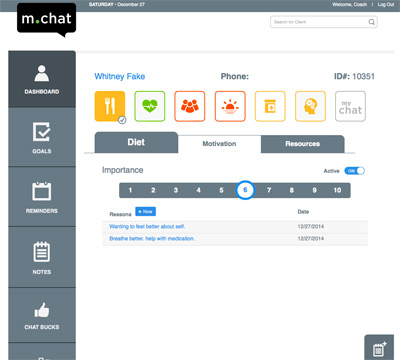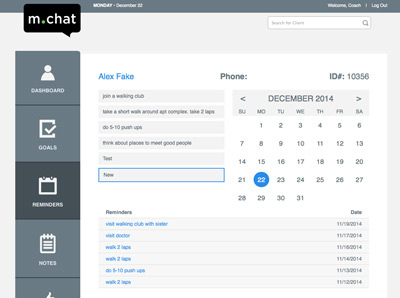Health coaching technology helps a vulnerable population
 |
 |
A UNT Health Science Center team has developed a technology-assisted health coaching program to help formerly homeless people, who are more likely to suffer from physical and mental health disabilities, live more independent lives.
The coaching program, called m.chat, is being funded by a Texas Medicaid 1115 waiver. It is designed to complement permanent supportive housing (PSH) programs that pair rental vouchers with case management services.
“PSH residents face significant challenges to living independently. Our goal is to help people make changes that will improve their health and well-being,” said Scott T. Walters, PhD, Professor of Behavioral and Community Health at the UNTHSC School of Public Health, who leads the m.chat project.
Associate Professor Emily Spence-Almaguer, PhD, MSW, a co-investigator on the project, has found that 73 percent of Fort Worth PSH residents report at least one chronic health condition, most commonly asthma, Hepatitis C, heart disease or COPD. Fifty-five percent have received treatment for a mental health condition, 67 percent report having a history of substance abuse, and 44 percent report both co-occurring substance abuse and mental health concerns.
From this data, m.chat was designed to address behaviors such as diet, exercise, substance use, medication adherence and social support.
The m.chat program has three features: in-person health coaching, specialized coaching software, and a system of “Chat Bucks” that can be earned for the purchase of health and wellness supplies, such workout gear, a scale, blood pressure monitor or a discounted YMCA membership.
The program’s goal is to help people make positive behavior changes and prevent more significant physical and mental health conditions from occurring.
Participants meet monthly with a coach who helps them set health and wellness goals. The m.chat software provides feedback on progress, offers tips and resources, and can send text alerts to remind people about their goals.
Hosea S., 57, one of the program’s first participants, found the Chat Bucks to be a real motivator.
“I’ve traded my bucks for athletic shoes, an MP3 player so I can listen to music while I walk, and even a movie gift card to help me stay busy, fight depression and get out more with others,” he said.
Hosea, who suffers from heart problems, has set goals to eat healthier, walk every morning and stop smoking.
“Already I’m feeling better,” he said.
For Teresa B., 55, the goal was to lose weight.
“When I started the program, I weighed 306 pounds and within a month I was down to 293,” she said.
Teresa, who is working on healthier eating habits, an exercise plan, pain management and issues related to bipolar depression and a history of drug abuse, said she is learning to take care of herself “in a good way, without asking for a pill.”
“I’m working with my health coach on good days and bad days,” she said. “I had a lot of friends who never made it to their 50s like me, and I realize now that I should have been taking better care of myself years ago. I feel like I’ve been given a second chance.”




Social media